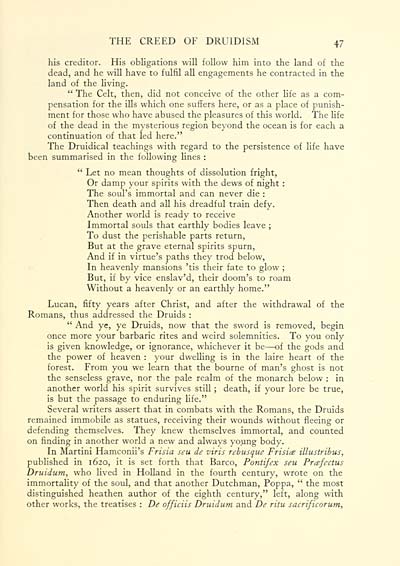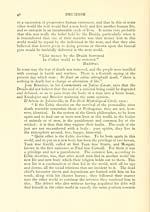Ossian Collection > Druidism
(67)
Download files
Complete book:
Individual page:
Thumbnail gallery: Grid view | List view

THE CREED OF DRUIDISM
47
his creditor. His obligations will follow him into the land of the
dead, and he wiU have to fulfil aU engagements he contracted in the
land of the Uving.
" The Celt, then, did not conceive of the other life as a com-
pensation for the ills which one suffers here, or as a place of punish-
ment for those who have abused the pleasures of this world. The life
of the dead in the mysterious region beyond the ocean is for each a
continuation of that led here."
The Druidical teachings with regard to the persistence of life have
been summarised in the following lines :
" Let no mean thoughts of dissolution fright,
Or damp your spirits with the dews of night :
The soul's immortal and can never die :
Then death and aU his dreadful train defy.
Another world is ready to receive
Immortal souls that earthly bodies leave ;
To dust the perishable parts return,
But at the grave eternal spirits spurn.
And if in virtue's paths they trod below.
In heavenly mansions 'tis their fate to glow ;
But, if by vice enslav'd, their doom's to roam
Without a heavenly or an earthly home."
Lucan, fifty years after Christ, and after the withdrawal of the
Romans, thus addressed the Druids :
" And yc, ye Druids, now that the sword is removed, begin
once more your barbaric rites and weird solemnities. To you only
is given knowledge, or ignorance, whichever it be — of the gods and
the power of heaven : your dwelling is in the laire heart of the
forest. From you we learn that the bourne of man's ghost is not
the senseless grave, nor the pale realm of the monarch below : in
another world his spirit survives still ; death, if your lore be true,
is but the passage to enduring life."
Several writers assert that in combats with the Romans, the Druids
remained immobile as statues, receiving their wounds without fleeing or
defending themselves. They knew themselves immortal, and counted
on finding in another world a new and always young body.
In Martini Hamconii's Frisia seu de viris rebusque Frisia illustribus,
published in 1620, it is set forth that Barco, Pontifex seu Prcefectus
Druidum, who lived in Holland in the fourth century, wrote on the
immortality of the soul, and that another Dutchman, Poppa, " the most
distinguished heathen author of the eighth century," left, along with
other works, the treatises : Dg officiis Druidum and De ritu sacrificorum.
47
his creditor. His obligations will follow him into the land of the
dead, and he wiU have to fulfil aU engagements he contracted in the
land of the Uving.
" The Celt, then, did not conceive of the other life as a com-
pensation for the ills which one suffers here, or as a place of punish-
ment for those who have abused the pleasures of this world. The life
of the dead in the mysterious region beyond the ocean is for each a
continuation of that led here."
The Druidical teachings with regard to the persistence of life have
been summarised in the following lines :
" Let no mean thoughts of dissolution fright,
Or damp your spirits with the dews of night :
The soul's immortal and can never die :
Then death and aU his dreadful train defy.
Another world is ready to receive
Immortal souls that earthly bodies leave ;
To dust the perishable parts return,
But at the grave eternal spirits spurn.
And if in virtue's paths they trod below.
In heavenly mansions 'tis their fate to glow ;
But, if by vice enslav'd, their doom's to roam
Without a heavenly or an earthly home."
Lucan, fifty years after Christ, and after the withdrawal of the
Romans, thus addressed the Druids :
" And yc, ye Druids, now that the sword is removed, begin
once more your barbaric rites and weird solemnities. To you only
is given knowledge, or ignorance, whichever it be — of the gods and
the power of heaven : your dwelling is in the laire heart of the
forest. From you we learn that the bourne of man's ghost is not
the senseless grave, nor the pale realm of the monarch below : in
another world his spirit survives still ; death, if your lore be true,
is but the passage to enduring life."
Several writers assert that in combats with the Romans, the Druids
remained immobile as statues, receiving their wounds without fleeing or
defending themselves. They knew themselves immortal, and counted
on finding in another world a new and always young body.
In Martini Hamconii's Frisia seu de viris rebusque Frisia illustribus,
published in 1620, it is set forth that Barco, Pontifex seu Prcefectus
Druidum, who lived in Holland in the fourth century, wrote on the
immortality of the soul, and that another Dutchman, Poppa, " the most
distinguished heathen author of the eighth century," left, along with
other works, the treatises : Dg officiis Druidum and De ritu sacrificorum.
Set display mode to: Large image | Transcription
Images and transcriptions on this page, including medium image downloads, may be used under the Creative Commons Attribution 4.0 International Licence unless otherwise stated. ![]()
| Early Gaelic Book Collections > Ossian Collection > Druidism > (67) |
|---|
| Permanent URL | https://digital.nls.uk/78950280 |
|---|
| Description | Selected books from the Ossian Collection of 327 volumes, originally assembled by J. Norman Methven of Perth. Different editions and translations of James MacPherson's epic poem 'Ossian', some with a map of the 'Kingdom of Connor'. Also secondary material relating to Ossianic poetry and the Ossian controversy. |
|---|
| Description | Selected items from five 'Special and Named Printed Collections'. Includes books in Gaelic and other Celtic languages, works about the Gaels, their languages, literature, culture and history. |
|---|

